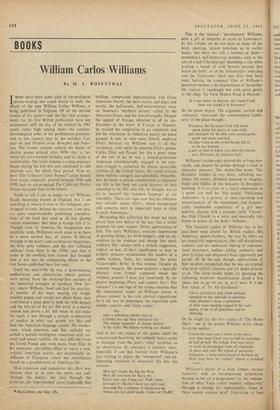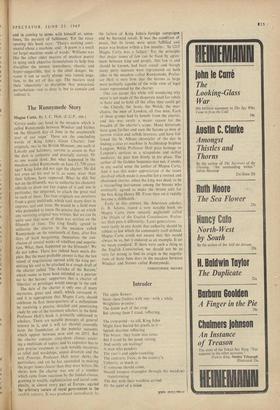BOOKS William Carlos Williams
By M. L. ROSENTHAL
WISH there were some kind of chronological jmirror-reading one could devise to undo the
effects of the way William Carlos Williams is being published in England. Of all the myriad ironies of his career—and the fact that arrange-
ments for his first British publication were not announced until the day of his funeral in 1963 surely ranks high among them,–the counter- chronological order of his posthumous presenta- tion to this country may be the weirdest. Last year we had Pictures from Brueghel and Pater- son. The former volume collects his books of shorter poems printed after 1950--that is, be- tween his sixty-seventh birthday and his death at seventy-nine. The latter volume is a long sequence begun during the last war and continued at odd intervals over the whole final period. Now we have The Collected Later Poems,* taken mostly from books originally printed between 1944 and 1950, and we arc promised The Collected Earlier Poems for some time in the future.
Truth to tell, I am so happy to see Williams finally becoming known in England that I am unwilling to remain frozen in this indignant, jaw- dropped attitude. Behind the situation, I am sure, are quite understandable publishing considera- tions of the kind that send us all into glaring retreat sometimes. But what a strange fate it is. Though even in America his recognition was painfully tardy, Williams's work came to us there in a more normal way, of course. It filtered through in the poetry and avant-garde magazines, the little early volumes, and the two 'collected editions' from them in the 1930s; and then it came in the swelling later stream that brought him at last into the culminating efforts of the two books published here last year.
Until the mid-1950s he was a hard-working paediatrician and obstetrician whose patients were mostly from the working-class sections of the industrial complex of northern New Jer- sey, where Williams lived and had his practice. A number of his most moving yet tough- minded poems and stories are about them; they contributed a great deal to both the wild despair and the hilarity of his art. His work as a doctor slowed him down a bit, but when he did make his mark it was through .a certain re-education of readers in what real people are like and how the American language sounds. His exuber- ance, visual precision and fine melodic ear served a mature intelligence concerned with cul- tural and sexual realities. He was different from his friend Pound and, even more, from Eliot in his conscious, unyielding effort to create a new, nativist American poetry, not provincially in- different to European values but nevertheless based on a ground-sense of American life.
How conscious and cumulative this effort was became clear to us over the years, not only through the poetry, but also through the criticism, the 'experimental' prose (especially that
• MacGibbon and Kee, 25s. brilliant, compressed improvisation, The Great American Novel), the short stories and plays and novels, the half-poetic, half-documentary essay on America's 'mythical history' called In the American Grain, and the Autobiography. Despite the appeal of Europe (detailed in all its am- bivalence in the novel A Voyage to Pagany), he resisted the temptation to go expatriate and led the revolution in American poetry on home ground. It was he who most bitterly deplored Eliot's betrayal (as Williams saw it) of that revolution, even while he admired Eliot's genius. Unlike Eliot and Pound, but like a great many of the rest of us, he was a second-generation American wholeheartedly engaged in the com- mon struggle to assimilate the almost intractable realities of the United States. He could criticise those realities savagely and splendidly. Neverthe- less, he made a certain commitment to whatever our life in the long run could discover its best meanings to be. His own role, he thought, was to try to 'unravel' the 'common language' of our sensibility. There are signs now that his influence may actually outlast Eliot's, whose background and concerns were in important ways so alien to most Americans.
Re-reading this collection has made me more aware than ever before of the way that a writer prepares his own readers' future appreciation of him. The early Williams's sensitive impressions of growing things, his birth-imagery, and his ab- sorption in the violence and change that mark ordinary life—always with a certain suggestion, explicit or not, of their significance as keys to [esthetic process—conditioned his readers in a subtle .fashion. Take, for instance, the poem 'Catastrophic Birth,' in this volume. Despite its concrete imagery, this poem presents a basically abstract, even formal argument about the 'rnsthetic process' I have just mentioned. Its ex- plosive beginning (`Fury and counter fury! The volcano!') is one sign of the strong emotion that the experienced reader of Williams knows is always present in his rare abstract expositions. So is the way he punctuates the exposition with smaller outcries and ironic asides: The
cone is subsiding, smoke rises as
a funnel into the blue unnatural sky—
The change impends! A change stutters in the rocks. We believe nothing can change.
And in just one stanza of this poem, amid the concentrated theorising, we suddenly have a scene or dialogue from the poet's 'other' existence as an obstetrician. Its relevance is joyously clear, especially if one has learned from Williams's past writing to expect the 'unexpected' and en- lightening intrusion of elemental life into his reveries:
Shut up! laughs the big she-Wop.
Wait till you have six like-a me.
Every year one. Come on! Push! Sure, you said it! Maybe I have one next year. Sweating like a volcano. It cleans you up, makes you feel good inside. Come on! Push!
This is the 'natural,' 'spontaneous' Williams, with a gift of empathy as acute as Lawrence's. In this volume we do not have as many of the brief, piercing, casual notations as in earlier books, but there are still a number of them— momentary, half-humorous sketches, such as the one of a half-Cherokee girl thumbing a ride while holding a bunch of wild flowers pressed 'just below the belly': or of the 'disconsolate' male dog and the 'frolicsome' bitch just after they have been 'halving the compass.' One of Williams's persistent themes is the heavenliness of the earthy. He realises it touchingly but with great gaiety in the elegy 'To Ford Madox Ford in Heaven':
Is it any better in Heaven, my friend Ford, than you found it in Provence?
So the poem begins. The argument, excited and colloquial, transcends the commonplace famili- arity of the plain thought :
Provence. the fat-assed Ford will never
again strain the chairs of your cafds pull and pare for his dish your sacred garlic, grunt and sweat and lick his lips. Gross as the world he has left to us he has become
a part of that of which you were the known part. Provence, he loved so well.
Williams's exuberance entered his writing phy- sically and shaped the poems through a kind of muscular pressure. The twelve-line poem 'The Kermess' renders in two dizzy, rollicking sen- tences the heavy, drunken dancing. to bagpipe, bugle and fiddles of the peasants in Brueghel's painting. It is as close to a literal experience as a poem can well be. The quieter 'Philomena Andronica' is a picture, at once charming and unsentimental, of the movements and languor- ously indefinable expectancy of a girl near puberty, playing with a younger child. 'Choral: the Pink Church' is a witty and musically rich hymn in praise of the body's holiness.
The 'musical' aspect of Williams has in the past been most elusive for British readers. His American speech-rhythms, the way he relies on an exquisitely improvisatory (but self-disciplined) cadence, and his audacious linking of unpreten- tious directness, sudden joking, outbursts and pure lyricism and eloquence have apparently put people off. In the end, though, appreciation of him involves recognition that he was an original who took stylistic chances and yet spoke directly to us. The timid reader might try speaking the following moderate manifestation aloud a few times, just to get his ear in, as it were. It is the first stanza of `To All Gentleness':
Like a cylindrical tank fresh silvered upended on the sidewalk to advertise some plumber's shop, a profusion of pink roses bending ragged in the rain speaks to me of all gentleness and its enduring. . . .
Or he might try the first stanza of 'The Horse Show,' one of the poems Williams wrote about his dying mother:
Constantly near you. I never in my entire sixty-four years knew you as well as yesterday or half so well. We talked. You were never so lucid, so disengaged from all exigencies• of place and time. We talked of ourselves. intimately, a thing never heard of between us. How long have we waited? almost a hundred
years.
Williams's fusion of a deep, simple, normal humanity with an encompassing ;estheticism became in his art a programme for the redemp- tion of what Yeats called 'modern subjectivity' through a strategy for impersonality. Some of these poems express grief, frustration in love and in coming to terms with himself or, some- times, the mystery of fulfilment. Yet the essay opening this book says: 'There's nothing senti- mental about a machine, and: A poem is a small (or large) machine made of words.' Williams was like the other older masters of modern poetry in using such objective formulations to help him discipline the intense inwardness, chaotic and hyper-suggestible, that is the chief danger, be- cause it can so easily plunge into ruined nega- tion, to the art of this age. The masters used their 'objectivity' • to discipline that precariotis perturbation—not to deny it, but to contain and redirect it.







































 Previous page
Previous page